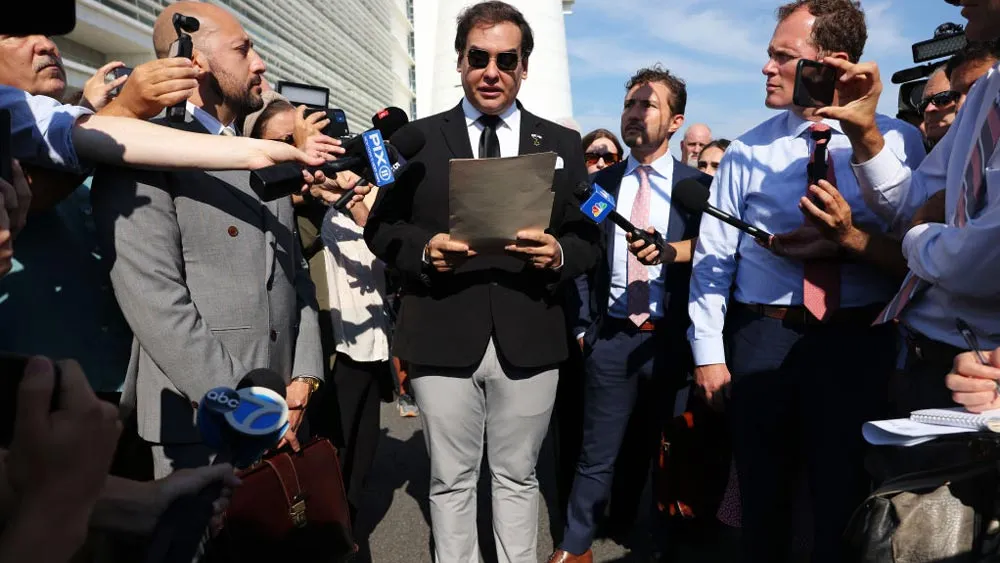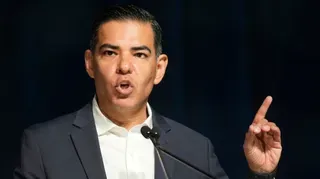May 25, 2010
McCain Slams DADT Repeal
Kilian Melloy READ TIME: 5 MIN.
Embattled Arizona Republican Senator John McCain struck out at attempts to repeal the military's ban on openly gay and lesbian troops before year's end.
President Obama had spoken of wanting to see the end of "Don't Ask, Don't Tell" this year in his January State of the Union Address. But the White House has been largely silent on the issue since Department of Defense secretary Robert Gates and Chairman of the Joint Chiefs of Staff, Navy Adm. Mike Mullen announced a year-long review of the issue, focusing on how to best implement a repeal of the 17-year-old anti-gay law.
Although polls show that 70% of Americans believe it is time to set the ban aside, Republicans have stepped into the gap left by the White House's silence, and sought to make the question an election year issue.
McCain, whose seat is seen as being in danger of going to Tea Party challenger J. D. Hayworth, said on a radio interview that Congressional Democrats and the Obama administration were attempting to "jam" repeal of the anti-gay law through the legislative process, reported The Hill on May 24. The article said that McCain slammed Democrats and the White House for reaching an accord on ending the ban soon through legislative means--though the agreement stipulates that the repeal would not go into effect until at least after the completion of the year-long review in 2011, after the upcoming midterm elections. The senator is the ranking member of the Senate Armed Services Committee.
Earlier this year, following the announcement of the year-long review of the policy by Gates and Mullen, McCain--who had previously indicated that he would follow the lead of military brass on the subject--abruptly did a 180-degree turn, noted NPR in a Feb. 2 article. The NPR article referred to a Washington Post item on McCain's about-face. The Post said that McCain had seemed to "shift" suddenly on the issue, and referenced a 2006 statement McCain had made in which he said, "The day that the leadership of the military comes to me and says, 'Senator, we ought to change the policy,' then I think we ought to consider seriously changing it."
Those words were seemingly forgotten when Gates and Mullen told Congress that the time had come to set aside the ban, noted the Post. Rather than embracing the words of the Chairman of the Joint Chiefs of Staff, McCain proclaimed himself "disappointed," and said, "At this moment of immense hardship for our armed services, we should not be seeking to overturn the 'don't ask, don't tell' policy," which McCain said was "imperfect but effective."
The Washington Post noted that McCain had become a critic of President Obama since his loss in the 2008 presidential race.
The yearlong review is seen as an unnecessary delay by proponents of repeal, who point to the success enjoyed by America's allies, all of whom have integrated their militaries without suffering the loss of morale, good order, military readiness, or cohesion that the ban's proponents insist would result if gay troops were free to declare the truth about themselves without being discharged for doing so.
Worse, opponents of DADT see any delay in ending the ban as possibly derailing repeal for years to come, given the national mood and the possibility that Republicans will take a large number of congressional seats in the fall.
McCain fell back on familiar talking points in the radio interview, telling Arizona station KBLU that, "This 'Don't ask, don't tell' issue, they're going to try to jam that through without even trying to figure out what the impact on battle effectiveness would be."
America's Allies: Gays Make Good Troops
Just last week, a coterie of officers from America's allies met at the Washington, D.C.-based Brookings Institute to share their views on how repeal of the anti-gay policy might affect America's military--or, more to the point, not affect it. The institute hosted military guests from Australia, Britain, Canada, Israel, and the Netherlands--all nations that have set aside their own bans on service by openly gay and lesbian troops.
"We know the U.S. as a country that favors the individual rights, freedom, giving the people the opportunity to flourish in their life," the Royal Dutch Navy's Col. Kees Matthijssen observed. "From that perspective it's still very strange the U.S. is still having a kind of ban on openly having gays and lesbians in the military."
"I did not see one case at any level when homosexuals did not get along with other soldiers," Maj. Gen. Walter Semianiw of Canada said, adding that military service for sexual minorities "is not an issue for our country."
Some of the anecdotes shared by the visitors verged on the humorous, though they made a point. Said British Royal Navy Lt. Cmdr. Craig Jones (retired), "There were concerns in the late '90s of gay men walking across the gangplank in feather boas and high heels." Sound preposterous? It was: "That just did not happen," said Jones, who went on to note that by setting aside its anti-gay ban, the British Royal Navy was able to hold on to talented personnel who happened to be gay.
That outcome was a far cry from fears that allowing openly gay people to serve in uniform would decimate the ranks, driving straight personnel out of the service and turning off young heterosexual recruits--warnings that are being issued in America today by anti-gay voices who want the ban to be kept in place. Virtually no one left the British military when their ban was ended and gays could serve openly, and neither morale nor discipline disintegrated.
Jones also said that setting aside the ban allowed the British military to draw on a whole new pool of recruits--young people who refuse to lie about who they are and tarnish their personal integrity in the name of serving their country honorably. Moreover, military retention is helped by adding openly gay people to the ranks: gays are less likely to have children and therefore less likely to leave their military careers due to family issues.
The article noted that on May 24, the White House announced that the Obama administration had forged a deal with key Democratic senators, including Chairman of the Armed Services Committee Carl Levin, Sen. Joe Lieberman, and Rep. Patrick Murphy to win support for legislation that would end the anti-gay ban.
Another prominent Republican spoke out as well against the deal. Massachusetts Senator Scott Brown said that, "It would be premature to act on a repeal of the 'Don't Ask, Don't Tell' law at this time." Added Brown, "The Pentagon is still in the midst of its study of the matter, and its report is due in December.
"For some time now, I have been seeking the opinions and recommendations of service chiefs, commanders in the field, and, most importantly, our junior soldiers, sailors, airmen and Marines," Brown continued. "I believe we have a responsibility to the men and women of our armed forces to be thorough in our consideration of this issue and take their opinions seriously.
"I am keeping an open mind, but I do not support moving ahead until I am able to finish my review, the Pentagon completes its study, and we can be assured that a new policy can be implemented without jeopardizing the mission of our military."
More than two-thirds of Americans support ending the ban, and nearly half of Republicans agree; Change.org noted in a Feb. 19 article that Dick Cheney had come out for repealing the ban, as had Colin Powell, who was one of the ban's architects in 1993.
Kilian Melloy serves as EDGE Media Network's Associate Arts Editor and Staff Contributor. His professional memberships include the National Lesbian & Gay Journalists Association, the Boston Online Film Critics Association, The Gay and Lesbian Entertainment Critics Association, and the Boston Theater Critics Association's Elliot Norton Awards Committee.







